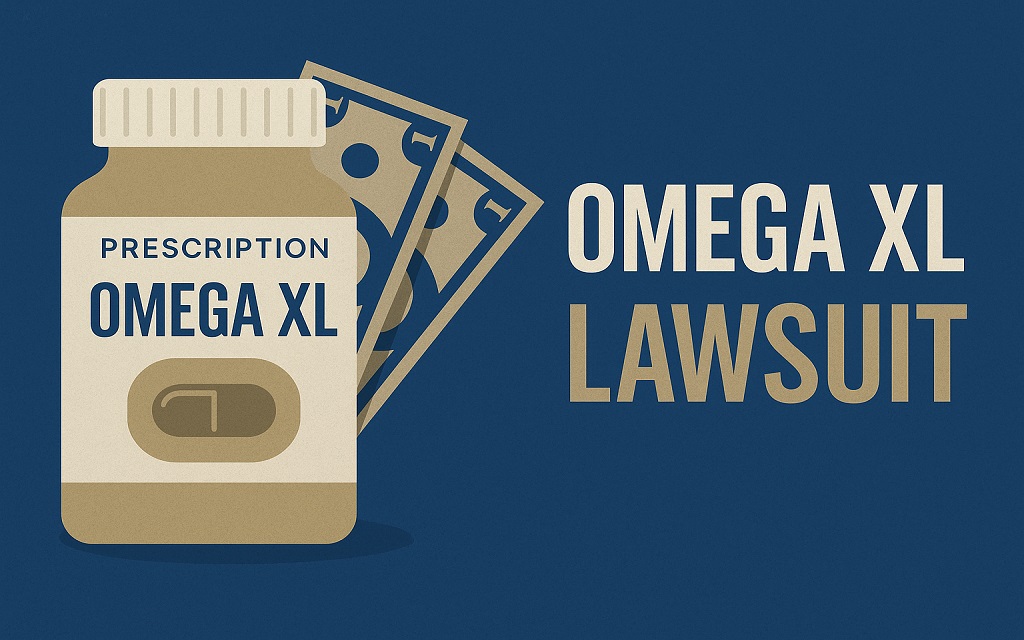You might be curious about Omega XL’s safety and legality. After the FDA warned the producer of the supplement, Great HealthWorks, Inc., the Omega XL lawsuit garnered widespread attention. It is said that this long-chain fatty acid product might lessen inflammation and joint discomfort without having the adverse effects of NSAIDs. Knowing that the supplement faces legal action and federal warnings is essential. You will find facts about the lawsuit, the FDA’s position, and your rights. The details can help you make smart decisions about health supplements.
What Is Omega XL?
You should understand what Omega XL claims to be. It is marketed as a joint health product and is a dietary supplement. Green-lipped mussel marine oil extract is used in the recipe. PCSO-524, a combination of omega-3 fatty acids, is the main component. The company marketed it as an NSAID substitute. Numerous advertisements claimed that it may lessen inflammation and arthritic discomfort. You may have seen public figures recommend products. However, no FDA approval backs those medical claims.
Why Is the Omega XL Controversy Important to You?
You must remain up to date on the Omega XL litigation. Great HealthWorks, Inc. received a severe warning from the FDA. Knowing that this firm produces Omega XL is crucial. They said the supplement might help reduce inflammation and joint discomfort. You may have seen their ads promising relief without side effects. Legal scrutiny and consumer reports now challenge those claims.
Key Legal Allegations
- Promoting Omega XL as a treatment for arthritis and chronic inflammation
- Lack of substantial clinical evidence
- Misleading advertisements using unverifiable testimonials
- Failure to comply with federal labeling standards
These elements led the FDA to issue a formal warning and raised the possibility of class-action lawsuits.
How Does Omega XL Make Its Claims?
Green-lipped mussels are used to make the supplement Omega XL, which includes a marine oil extract called PCSO-524. You may have seen it marketed as a powerful joint health solution. Advertisers said it works better than NSAIDs. Many people trusted the product based on testimonials and celebrity endorsements.
Why Did the FDA Warn the Manufacturer?
The FDA reviewed the company’s marketing content. It is essential to understand that the agency found violations of federal law. The FDA claims that Great HealthWorks sold Omega XL as a medication. That broke the Federal Food, Drug, and Cosmetic Act. According to the product’s claims, it may help treat various illnesses, including arthritis.
You should know that the FDA warning letter included the following concerns:
- The company made unproven treatment claims
- Advertisements lacked reliable clinical support
- Marketing included misleading testimonials
- The label failed to follow federal standards
The FDA demanded immediate corrections. The agency gave the company 15 days to respond.
How Did the NAD React to Omega XL’s Advertising?
The National Advertising Division (NAD) also examined Omega XL promotions. You may be wondering what they found. The NAD concluded that many claims lacked proper evidence. They advised the company to change or remove those statements.
You should know the key NAD findings:
- Pain relief claims had no scientific basis
- Inflammation reduction statements were vague
- The ads did not follow truth-in-advertising guidelines
These findings add more legal pressure on the manufacturer.
What Complaints Have Consumers Filed?
You need to consider what buyers have said. Many consumers reported negative experiences. Some claimed the supplement failed to deliver results. Others mentioned allergic reactions. Many noted that side effects were never disclosed.
Consumer complaints included:
- No visible improvement in joint health
- Unexpected allergic responses
- Misleading money-back guarantees
- Aggressive sales practices
Multiple platforms collected hundreds of complaints. The Better Business Bureau also received several reports.
What Legal Actions Can You Expect?
The possibility of a class action lawsuit has increased. Lawyers are currently investigating claims. You may qualify if you bought Omega XL and felt misled.
Attorneys are reviewing:
- Deceptive advertising strategies
- Breach of implied and written warranties
- Potential consumer fraud violations
- Injury or medical issues linked to the product
You should gather receipts and records. Documentation strengthens your case.
How Does Omega XL Compare to Other Joint Supplements?
You need to evaluate alternative products. Many supplements, such as glucosamine, turmeric, and MSM, have few studies supporting their effects.
Key comparisons include:
- Omega XL lacks peer-reviewed clinical trials
- Competitors offer more transparent ingredient lists
- Many rivals show better consumer satisfaction
You should ask a healthcare provider before taking any supplement.
What Should You Do If You Feel Misled?
You should take action if you used Omega XL and feel deceived. Begin by writing down your experience. Include the date and location where you bought the product. Keep all receipts, labels, and packaging.
You should contact a consumer protection attorney. Most offer free consultations. If a lawsuit proceeds, you may receive compensation.
Steps to follow:
- Collect all documents and proof of purchase
- Record medical issues or side effects
- Contact a qualified attorney
- Report your experience to the FDA or BBB
Why Does the Supplement Industry Care About It?
It is crucial to know that the Omega XL casing raises significant problems. Many companies in the supplement industry make unsupported medical claims, and the sector is often poorly regulated. The FDA notification reminds manufacturers to follow the law.
You should demand transparency in health products. Always verify claims before purchasing.
What Final Steps Should You Take?
If you bought Omega XL, you should check your health. Contact your doctor if you notice issues. File a complaint with consumer agencies. Speak to a legal expert for guidance. Stay informed through verified legal updates.
Conclusion: What Should You Remember About the Omega XL Lawsuit?
In short, you should take every health claim seriously and know your rights as a consumer. The legal problems with Omega XL remind you to do your homework and confirm safety before purchasing supplements. Always read reviews, get expert advice, and ask questions before believing any health-related claims.
Must Read: Paraquat Lawsuits: What You Need to Know About Settlements and Legal Action
FAQs
Does the FDA approve Omega XL?
You should know that Omega XL is not FDA-approved. It is sold as a supplement, not a drug.
Can I join a lawsuit against Omega XL?
You may qualify if you experienced adverse effects or misleading claims.
What are the key problems with Omega XL?
Key problems include false advertising, lack of clinical support, and safety concerns.
What should I do if I feel scammed?
You should contact an attorney, keep records, and file reports.
Musarat Bano is a content writer for JudicialOcean.com who covers lawsuits, legal news, and general legal topics. Her work focuses on research-based, informational content developed from publicly available sources and is intended to support public awareness. She does not provide legal advice or professional legal services.




